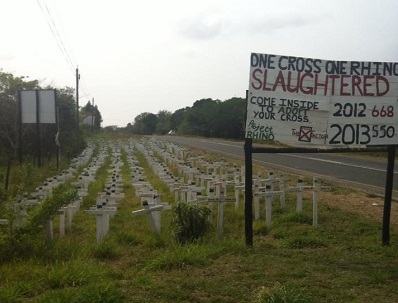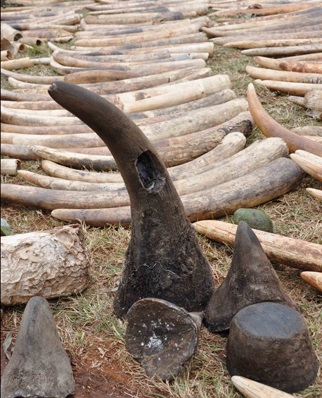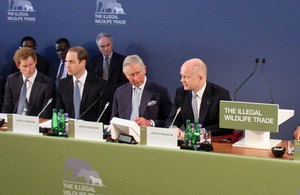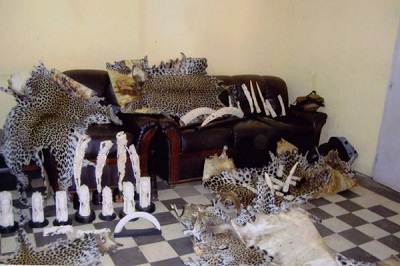[Exclusive] Two Rhinos and 30 Elephants Poached Every Day

With record levels of global ivory seizures in 2013, mostly in ports, a new Interpol report highlights the need for greater information sharing to enable a more proactive and effective law enforcement response against trafficking syndicates.
 Large-scale ivory shipments – each one representing the slaughter of hundreds of elephants – point to the involvement of organized crime networks operating across multiple countries. Head of Interpol’s Environmental Security unit, David Higgins, said while there was a global recognition of the problems of elephant poaching and ivory smuggling, a more integrated approach was needed for a more effective response.
Large-scale ivory shipments – each one representing the slaughter of hundreds of elephants – point to the involvement of organized crime networks operating across multiple countries. Head of Interpol’s Environmental Security unit, David Higgins, said while there was a global recognition of the problems of elephant poaching and ivory smuggling, a more integrated approach was needed for a more effective response.
“Ivory seizures are clearly an important step in stopping this illicit trade, but this is just one part of a much bigger picture,” said Higgins. “If we are to target those individuals behind the killing of thousands of elephants every year, who are making millions at the cost of our wildlife with comparatively little risk, then we must address each and every stage of this criminal activity in a cohesive manner.
The report ‘Elephant Poaching and Ivory Trafficking in East Africa – Assessment for an effective law enforcement response’ was launched at the Canadian High Commissioner’s Residence in Nairobi, Kenya.
 While poaching in Kenya has reduced due to more pressure by security agents on poachers, the country is being used as a transit route with the port of Mombasa becoming a favorite for poachers. The ivory is packaged in shipping containers for transport to the port, and interception of the majority of ivory has occurred in maritime ports with the loot hidden in shipment containers usually concealed by other lawful goods.
While poaching in Kenya has reduced due to more pressure by security agents on poachers, the country is being used as a transit route with the port of Mombasa becoming a favorite for poachers. The ivory is packaged in shipping containers for transport to the port, and interception of the majority of ivory has occurred in maritime ports with the loot hidden in shipment containers usually concealed by other lawful goods.
Uganda though a landlocked country is becoming a transit route for the ivory, mostly from Tanzania. Tanzania was the leading source of illegal ivory in the East African region last year. At the same time, the port of Mombasa accounted for the largest volume of seizures in Africa with a total of over 10 tonnes of illegal ivory intercepted between January and October 2013.
Approximately 30 elephants are killed in Tanzania daily amounting to more than 10,000 animals annually. An estimated 22,000 elephants were killed illegally continent wide in 2012.
Tanzania’s elephant population has continued to plummet in recent years and in Selous Game reserve which boasted the world second largest elephant population at 70,000 elephants in 2006, the numbers have fallen to an estimated 39,000 elephants in 2009 and currently stand at 13,084 elephants.
 There is global concern about the problem. The Illegal Wildlife Trade Conference, held in London this month, agreed key actions to stamp out the illegal wildlife trade. During the conference, chaired by Foreign Secretary William Hague and attended by the Prince of Wales, the Duke of Cambridge and Prince Harry, world leaders from over forty nations vowed to help save iconic species from the brink of extinction.
There is global concern about the problem. The Illegal Wildlife Trade Conference, held in London this month, agreed key actions to stamp out the illegal wildlife trade. During the conference, chaired by Foreign Secretary William Hague and attended by the Prince of Wales, the Duke of Cambridge and Prince Harry, world leaders from over forty nations vowed to help save iconic species from the brink of extinction.
The London Declaration contains commitments for practical steps to end the illegal trade in rhino horn, tiger parts and elephant tusks that fuels criminal activity worth over $19 billion each year.
Key states, including Botswana, Chad, China, Gabon, Ethiopia, Indonesia, Tanzania, and Vietnam, along with the US and Russia, have signed up to actions that will help eradicate the demand for wildlife products, strengthen law enforcement, and support the development of sustainable livelihoods for communities affected by wildlife crime.
 These include:
These include:
• support for continuing the existing international ban on commercial trade in elephant ivory;
• renouncing the use of products within governments from species threatened with extinction;
• amending legislation to make poaching and wildlife trafficking “serious crimes” under the terms of the UN Convention against Transnational Organized Crime;
• strengthening cross-border co-ordination and support for regional wildlife law enforcement networks;
• further analysis to better understand the links between wildlife crime and other organised crime and corruption, and to explore links to terrorism.
The conference heard first-hand from the Presidents of Botswana, Chad, Gabon and Tanzania, and the Foreign Minister of Ethiopia, who announced the proposal of an Elephant Protection Initiative to secure new funding from private and public sources for the implementation of the African Elephant Action Plan.
The plan includes commitment to an extended moratorium on ivory sales, as well as plans to put ivory stocks beyond economic use. The UK Government announced it would provide support to help the Initiative get up and running.
.jpg) The London Declaration, and the Elephant Poaching Initiative, come at a crucial time as demand for illegal wildlife products has risen sharply in the last decade.
The London Declaration, and the Elephant Poaching Initiative, come at a crucial time as demand for illegal wildlife products has risen sharply in the last decade.
Rhino poaching increased 5,000 per cent between 2007 and 2012, with one killed by a poacher every ten hours. Since 2004 the Central Africa region has lost two-thirds of its elephant population, and last year saw the Western Black Rhino declared extinct.
The lives of those working hard to protect endangered wildlife are also at risk, with at least 1,000 park rangers killed over the last decade alone. This in turn fuels a cycle of instability, affecting poverty levels as well as regional and international security.
Botswana has now announced that it will host a further Conference in early 2015 to review progress against the commitments made in the London Declaration.
